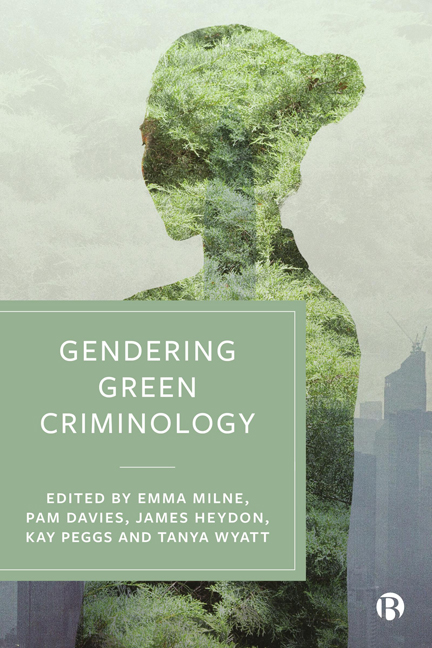3 - New Directions Please! Veganising Green Criminology
Published online by Cambridge University Press: 28 March 2024
Summary
Introduction
This chapter calls for a new direction in green criminology – an ethical veganising of the field. Ethical veganism opposes speciesism and the commodity status of nonhuman animals. Through the lens of ethical veganism, this chapter offers a critical consideration of gendering green criminology by drawing in issues associated with species and with human–nonhuman animal entanglements. I seek to address (the occlusion of) the enormity of nonhuman animals’ victimisation by proposing a veganising of the field of green criminology within the context of a mainstreaming of non-anthropocentric, and preferably non-speciesist, criminology. Although some green criminologists have overlooked or marginalised the position of nonhuman animals, especially nonhuman animals who live outside of what is usually conceived to be ‘the environment’, green criminology can encourage thinking about and alleviating the human exploitation of nonhuman animals within and beyond the bounds of ‘the environment’. As well, criminology that is not ‘green’ has the tools and perspectives to study more effectively harms and crimes to all species, thus shifting away from the largely anthropocentric focus that is currently evident.
To reflect on how to fulfil these goals, where appropriate this chapter draws on lessons from feminist criminological thought and from intersectional analysis. Because the chapter embraces a non-speciesist intersectional approach, speciesism and the place of species within intersectionality and within green criminology are discussed at length. As veganism is the driver for this chapter, there is a section on what constitutes veganism. By employing both intersectionality (Hill Collins and Bilge, 2016) and veganism as forms of critical praxis the chapter concludes with a call to veganise and gender green criminology via activism, with the aim of changing the world for the better (see Belknap, 2015). I begin with a discussion about speciesism and its place within multiple axes of inequalities, inequalities that are at the heart of much criminological theorising and research (Heimer, 2019).
Speciesism, intersectionality and criminology
Although generally marginalised in the social sciences, ‘species is a foundational identifier of difference’ (Hovorka, 2012: 876). Species classifications are based in essentialist assumptions about purported natural and intrinsic properties that are considered to be impervious to change (for discussion see de Vel-Palumbo et al, 2019).
- Type
- Chapter
- Information
- Gendering Green Criminology , pp. 34 - 52Publisher: Bristol University PressPrint publication year: 2023

